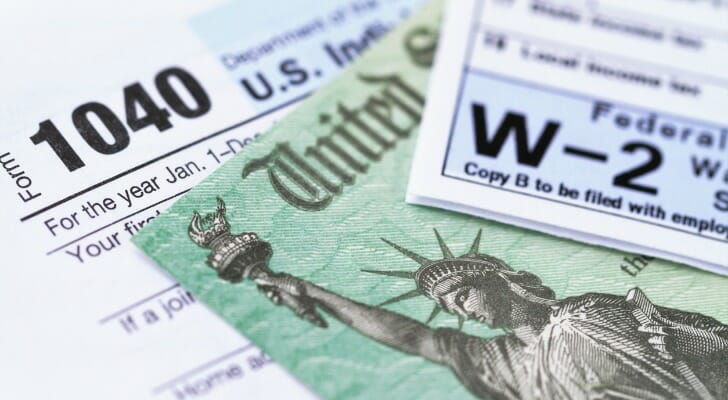Most Americans have very simple tax needs: their employer handles biweekly withholding, and then come April, they file a tax return for either a refund or payment based on their standard deduction. However,, things can get a little more complex than that, depending on how you manage your investment portfolio. If you have significant investments or multiple forms of income, a tax advisor may be necessary to properly manage your tax liability. Just as importantly, an expert can help you avoid mistakes when filing so you are not plagued by any unnecessary delays.
You could consider working with a financial advisor for help building a tax plan for your financial future.
What Are the Different Types of Tax Advisors?
There are several types of tax advisors, withe each offering a distinctive type of expertise or relationship. Your particular needs and specific budget will help determine which type of tax advisor is appropriate for you.
Professional Certified Public Accountants (CPAs)
Professional Certified Public Accountants (CPAs) are the most expensive, but also the most useful option. A CPA is someone who works full-time throughout the year like an accountant, although their busiest season runs from January through April.
However, CPAs aren’t one-off agents like retail accountants. As a result, they have the kind of expertise that seasonal tax preparers tend to lack, although CPAs do sometimes rely on tax software like TurboTax to simplify things.
The advantage to a professional CPA is that they know the tax code, inside and out. They can explain rules and limits while answering questions in a way that no software or retail accountant can.
A full-time accountant can help you spot issues that you might otherwise have missed. They’ll know what to ask you for after reviewing your files with you, and they will ask for more information if you didn’t think to provide something. A computer can’t offer feedback, and a retail accountant won’t likely be able to spend real time with you.
However, it is important to remember that you get what you pay for. While extremely valuable, a professional CPA is the most expensive option.
Enrolled Agents (EAs)
An enrolled agent is a tax professional with authorization from the federal government to represent taxpayers before the Internal Revenue Service (IRS) at all levels. Enrolled agents have unlimited practice rights, which means they can advise and represent individuals, corporations, trusts and any other entity required to file taxes.
An EA can prepare your tax return for you, as well as advise on any tax-related concerns. Furthermore, if you need to deal with the IRS in any capacity – for instance, in an audit – an EA can represent you, providing you with an expertise you otherwise wouldn’t have.
Tax Consultants
A tax consultant can help you in several ways:
With more expertise than standard tax preparers, tax consultants can also help with complex tax needs, such as inheritance issues and charitable giving. Often, these advisors have training in tax law or accounting. Fees vary depending on the scope of work and the tax consultant’s skill and experience.
Tax consultants usually work for financial consulting firms, public accounting firms or government agencies. Some may also operate completely independently.
In many cases, tax consultant services are available online, although you can usually access services through an office, as well. Clients range from individuals and families to small businesses, organizations and corporations.
Online Tax Software
Online tax software is a collection of computer forms that you complete online to prepare and file your taxes.
They come pre-programmed with tax codes, exemptions and other necessary calculations to correctly calculate what taxes you owe. At the end, the software generates a prepared set of tax forms that you can either e-file or print out and mail. Two of the most popular software options are TurboTax and H&R Block, although there are many different software packages on the market.
Software packages are much cheaper than hiring a human advisor. They are effective, as well, since the tax code is straightforward enough for computers to handle.
However, this system is only as good as its programming. The software can’t predict your specific needs, so it may fail to ask a certain tax question, anticipate a specific situation or explain something in detail if you don’t understand.
An automated system is good for taxpayers with simple tax returns who want to ensure they don’t miss any possible tax exemptions or credits. If your finances are more complex, you may want to seek out a professional.
Retail Tax Preparers
Retail tax preparers are the tax professionals whom you hire at a franchise like H&R Block. These preparers typically work seasonally; they help taxpayers only during the busy months of the year.
Generally speaking, a retail tax preparer relies on automated systems to do most of their work. These systems are similar, if not identical, to those a taxpayer can use on their own. The preparer takes your forms and plugs in the numbers.
While a retail tax preparer usually has more expertise than you do, they’re nowhere near as skilled as a full-time accountant. They also rarely have time to ask questions or explore your specific needs because they work on customer volume during the busiest time of year.
These preparers might work in some cases, but the bottom line is this: if you’re spending the money on an advisor, a real professional may be a preferable option. However, if you want to save money, online tax software may be the better route to take.
Should You Use a Tax Advisor?

When deciding whether to work with a tax advisor, there are a few considerations that can help you determine which is best.
When to Use Tax Software
First, tax software is generally quite useful. It can help you spot potential deductions and credits you otherwise may miss. For someone with relatively simple taxes, it’s often a good idea to spend the money.
You may benefit from tax software if you:
- Only have W-2 income
- Do not itemize your taxes
- Have no investments beyond ordinary stocks and bonds
- Have only one state of residence
In other words, if you anticipate filing few, if any, forms beyond a standard 1040, tax software may be a good option.
When to Work With a Tax Advisor
The more forms your taxes require, the more likely it is that you will benefit from hiring a tax advisor.
Generally speaking, the IRS requires a new form for each aspect of your taxes. For example, multiple streams of income require a new form, as do investments, deductions and other tax events.
Working with a tax advisor may be preferable if you:
- Are self-employed or own a small business
- Have significant investment income, such as rental properties or dividends
- Have complex investments, including:
- Have made significant transactions over the past year, such as real estate or numerous sales of stocks and bonds
- Have earned income in multiple jurisdictions
- Itemize your taxes
Two Good Rules of Thumb
One rule of thumb is that the more tax events you have, the more likely it is that working with a tax advisor can help you save money.
Any time that you make or lose money, the IRS considers this a taxable event, which is an event that changes how much you will owe on your end-of-year taxes. For example, if you rent your apartment on Airbnb, you have triggered a tax event by making money. If you sell stocks for a loss, you’ve triggered a tax event by losing money.
The more tax events you have in a given year, the more likely it is that your taxes will touch on different parts of the tax code. This means that you have more ways to save money through deductions and exclusions. It also means that you have more ways to owe money, so a tax advisor can help ensure you don’t miss them.
Another rule of thumb is that the more jurisdictions you cross, the more likely that a tax advisor can help you avoid common mistakes. Every time your money crosses a border, you are subject to new tax laws. This includes different states throughout the United States and across international borders worldwide.
Each new set of laws creates new ways you can make mistakes and new opportunities to miss something.
Common Tax Situations That Can Change Your Filing
Many tax returns become more complex because of a single event, not an overall change in income.
Selling stocks, mutual funds or other investments creates capital gains or losses that must be reported on additional forms. The holding period, cost basis and timing of the sale all affect how the income is taxed, adding steps beyond a basic Form 1040.
Earning income outside a regular paycheck also increases complexity. Freelance work, side gigs and contractor income typically require reporting on Schedule C and may trigger self-employment taxes. Unlike W-2 wages, taxes are not withheld automatically, which can affect estimated payments and year-end balances.
Real estate activity often introduces multiple layers of reporting. Tax rules vary, depending on whether you are reporting rental income, short-term rentals or property sales. Additionally, depreciation, deductible expenses and passive activity limitations can change how income or losses are treated from year to year.
State and location changes also affect filing requirements. Moving to another state, working remotely across state lines or earning income in multiple states can require multiple state returns. Each state applies its own tax rules, deductions and credits, increasing the risk of reporting errors.
One-time financial events can also shift a return into a more complex category, with events like these often requiring special tax treatment.
- Inheritances
- Stock compensation
- Business sales
- Large withdrawals from retirement accounts
These events may affect taxable income, deductions and future tax years, even if they occur only once.
Bottom Line

If you have relatively simple taxes requiring only a Form 1040 or are only reporting W-2 employment, you can probably spare the expense of a tax advisor. However, if you have complex tax issues like multiple sources of income, significant investments or multiple jurisdictions, a tax advisor is probably a good idea.
Tips on Taxes
- Complicated finances can lead you to work with a tax advisor or a financial advisor. Finding a qualified financial advisor doesn’t have to be hard. SmartAsset’s free tool matches you with financial advisors who serve your area, and you can interview your advisor matches at no cost to decide which one is right for you. If you’re ready to find an advisor who can help you achieve your financial goals, get started now.
- Use our no-cost income tax calculator to get a quick estimate of what your federal income taxes will look like.
Photo credit: ©iStock.com/NoDerog, ©iStock.com/primipil, ©iStock.com/Eoneren
